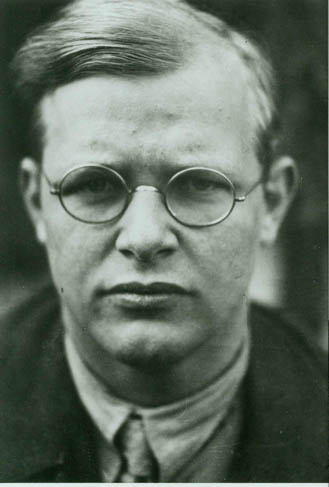 Dietrich Bonhoeffer inspires me. I’ve been fascinated by Bonhoeffer since the day Michael Weed introduced me to the Christian author, theologian, and martyr in a theology class at Austin Grad a little over five years ago. Bonhoeffer moves me. Not just because he wrote about true discipleship to Jesus, not just because he preached against the cheap grace he saw accepted and practiced in the Church, and not just because he talked all the time about the ultimate lordship and reign of Christ. Bonhoeffer moves me because he so truly lived it. He embodied it. He gave his life for it.
Dietrich Bonhoeffer inspires me. I’ve been fascinated by Bonhoeffer since the day Michael Weed introduced me to the Christian author, theologian, and martyr in a theology class at Austin Grad a little over five years ago. Bonhoeffer moves me. Not just because he wrote about true discipleship to Jesus, not just because he preached against the cheap grace he saw accepted and practiced in the Church, and not just because he talked all the time about the ultimate lordship and reign of Christ. Bonhoeffer moves me because he so truly lived it. He embodied it. He gave his life for it.
So I pay attention to Bonhoeffer. He was real. He put his very life on the line for what he preached and wrote about commitment to Jesus and God’s salvation mission in the world. As Paschal once noted, “I tend to believe the witnesses who get their throats cut.” Me, too.
It’s been almost three weeks since I finished reading Eric Metaxas’ hefty biography, Bonhoeffer: Pastor, Martyr, Prophet, Spy. I’ve spent several hours since going back over the things I’ve highlighted, re-reading the pages I’ve marked up, trying desperately to will the words and the passion of this great man into my very soul.
There’s so much I want to share with you from this book. His writings about the Church sound as if they were penned yesterday. His understanding of the Gospel is as clear as if he were at those resurrection meals with Jesus. His call for true discipleship to our Lord is challenging. Convicting.
Personal.
Allow me to give you a taste.
Bonhoeffer was greatly troubled by the secularization he saw in the Church. The focus, as he saw it, wasn’t as much on the central Christian doctrines of forgiveness and grace, sanctification and discipleship, resurrection and justice as it was on progress and success, relevancy and status. Note how his observations about the big churches in New York City, written when he was at Union Theological Seminary in 1930, ring just as true today.
“In the place of the church as the congregation of believers in Christ there stands the church as a social corporation. Anyone who has seen the weekly program of one of the large New York churches, with their daily, indeed almost hourly events, teas, lectures, concerts, charity events, opportunities for sports, games, bowling, dancing for every age group, anyone who has heard how they try to persuade a new resident to join the church, insisting that you’ll get into society quite differently by doing so, anyone who has become acquainted with the embarrassing nervousness with which the pastor lobbies for membership — that person can well assess the character of such a church. All these things, of course, take place with varying degrees of tactfulness, taste, and seriousness; some churches are basically ‘charitable’ churches; others have primarily a social identity. One cannot avoid the impression, however, that in both cases they have forgotten what the real point is.”
Ah, the point. What is the point? What is God’s mission for his Church? What do we aim for? What do we live for? What’s the goal? What’s the point?
To seek and to save the lost. To bind up the injured and strengthen the weak. To release the captives and set the prisoners free. To proclaim and to live in the truth that God in Christ has defeated the dark forces of sin and death and Satan and is right now making his dwelling place among us, renewing and restoring all of creation, reconciling the world to himself in righteous relationship so that we will be his people and he will eternally be our God.
It’s hard work. It’s dirty work. It’s grimy and messy. It requires muscle and sweat and blood and tears. It takes great sacrifice. It takes every ounce of everything you’ve got.
But that is the point. Let’s not ever forget the point.
~~~~~~~~~~~~~~~~~
 Today is my great friend Dan Miller’s 50th birthday. In honor of Dan, let’s all repair our cars with duct tape and twistie ties and order extra cheese. On everything.
Today is my great friend Dan Miller’s 50th birthday. In honor of Dan, let’s all repair our cars with duct tape and twistie ties and order extra cheese. On everything.
Happy birthday, Dan. I love you, brother. You mean the world to me.
Allan
Leave a Reply